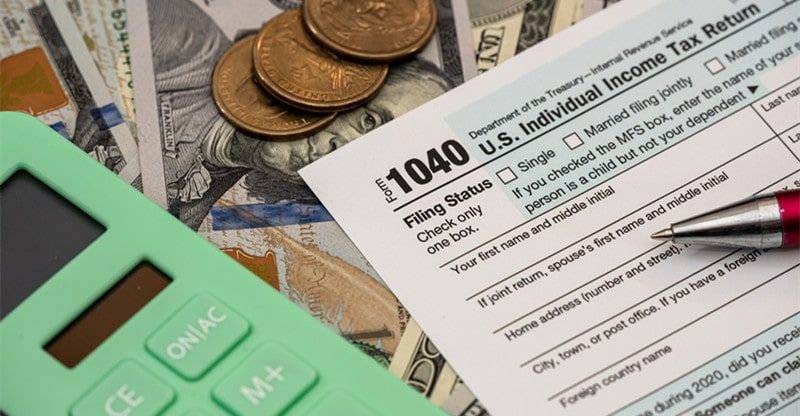Minimum Income To File Tax
To uncover whether you’ll need to file a tax return, you’ll need to consider all of your income revenue streams using a self-assessment to create an accurate picture of your total household income.
Some people, if they fall under the minimum requirement, will not need to file a tax return. However, if you are over the tax threshold, you will need to ensure your tax return is sent back to the IRS promptly to avoid financial penalties.
Minimum Income to File Tax
There’s no actual minimum for filing a return. The amount is determined by your filing status, age and can be affected by things such as disability or housing status.
Your filing status for 2022 depends on whether your income for your age and household situation groups falls below the following thresholds:
Single – under 65: $12,400
Single – over 65: $14,050
Married, filing separately: $5
Head of household – under 65: $18,650
Head of household – over 65: $20,300
Married, filing jointly – under 65 (both spouses): $24,800
Married, filing jointly – over 65 (one spouse): $26,100
Married filing jointly – over 65 (both spouses): $27,400
Qualifying widow(er) with dependent children – under 65: $24,800
Qualifying widow(er) with dependent children – over 65: $26,100
Self-employed: $400
Minimum Filing Requirements for Dependents
If you are a dependent, but still a working adult, you are not necessarily exempt from filing a tax return. However, the tax return thresholds may be slightly different.
Single dependents – under 65: $12,400 earned or $1,100 unearned income
Single dependents – over 65 or blind: $14,050 earned or $2,750 unearned income
Single dependents – over 65 AND blind: $15,700 earned or $4,400 unearned income
Married dependents – under 65: $12,400 earned or $1,100 unearned income OR if your income was at least $5 but your spouse has filed an itemized return
Married dependents – over 65 or blind: $13,700 earned or $2,400 unearned income OR if your income was at least $5 but your spouse has filed an itemized return
Married dependents – over 65 AND blind: $15,000 earned or $3,700 unearned income OR if your income was at least $5 but your spouse has filed an itemized return
Special Circumstances: Do I Need to Complete a Tax Return?
Even if your earnings fall below the thresholds to file a tax return, there may still be exceptional circumstances that require you to file. For this reason, it may be worth filing a return, even if you don’t believe you owe tax. This is to make the IRS aware of your status and to cover your back, so you won’t miss any payments or receive any penalties. You’ll still need to file if:
- You earned $108.28 from a tax-exempt church or other organization.
- You received distributions from your Health Savings Account (HSA).
- You owe household employment taxes.
- You owe Alternative Minimum Taxes or tax on a savings account or retirement plan.
- You are self-employed and earned over $400.
- You owe Social Security or Medicare taxes or make some of your income in tips which are unreported.
U.S. Federal Tax Return – Must File Circumstances
There are circumstances that many people consider as making them exempt from filing a tax return, but actually, it’s still necessary to do so. These circumstances can trip you up if you aren’t sure and cause you to incur penalties further down the line.
You must file if:
- You are an expat or have lived and worked overseas, even if this is for the whole of the tax year.
- You are a minor but have earned income above the listed thresholds.
- You have income into your U.S. bank account from another country, even if you are in the U.S.
Proceeds From Broker and Barter Exchange Transactions
If you receive income from stocks, bonds or shares that might take you over the tax thresholds, even if that income isn’t technically ‘earned,’ you may still need to file a tax return if you filled in a Form 1099-B. This is because the number you place in box 1d may take you over the income threshold, meaning you qualify to pay tax on your exchange transactions.
If the box 1e on this same form is left blank, this may make you exempt from paying tax on the income from exchange transactions.
Should I File a Tax Return in 2022 Anyway?
Filing a tax return even if it’s not necessary can have its benefits too. For example, if you feel you are due a refund, you will need to file a tax return to receive that refund.
Even if you haven’t met the thresholds for filing a return, you could still be due a refund if:
- You are due first-time homebuyer credit.
- You qualify for Adoption Credit Tax.
- You qualify for Earned Income Tax Credit.
- You have been overtaxed previously.
- You have overestimated the tax you should pay in previous years.
- You qualify for federal fuel tax credit.
- You qualify for Child Tax Credit.
- You qualify for Health Coverage Tax Credit.
When Should I File My Tax Return 2022?
The deadline for filing a tax return to the IRS is April 18, 2022, for the 2021 tax year. The IRS opens up for returns any time from the middle of January 2022, so you have plenty of time to file.
If you don’t have all of the financial documentation that you need for the 2021 tax year by April 2022, you can request an extension until October 2022 without incurring any financial penalties. However, failure to file at this stage will result in a fine.
How Do I File My Tax Return 2022?
The IRS now encourages people to file a tax return online through their website. This is a faster process for you and also means that you will receive any refund much faster than a paper filing.
If you’re concerned about filing a tax return or you’re unsure how much you need to declare, a professional tax service can help you to understand your earnings and correctly file your return so that you don’t miss any essential details that could lead to a fine.
What is a Self-Assessment (SA)?
A self-assessment tax return is a process which allows taxpayers to understand their total income across all revenue channels and report it to the HMRC in the UK. This will help you to understand which tax threshold you hit and how much tax you need to pay on your earnings if you have any form of income in the UK or are temporarily living in the UK.
It will also give you an indication on whether you have ever paid too much tax or if you are due a tax refund from the HMRC.
A self-assessment may be required if you’re living or working outside the U.S. and are being taxed automatically on a ‘pay as you earn’ basis in the UK.
U.S. citizens living temporarily in the UK, for example, are likely to have taxable income where the tax is removed at source, rather than being added to a year-end tax return.
A self-assessment, in this case, will allow you to declare the tax that you’ve previously paid to prevent you being taxed again on your tax return back in the U.S.
These assessments also allow you to determine your full tax liability if you are self-employed or the owner of a company in the UK and therefore, not being taxed as part of a payroll system.
You may need to complete a self-assessment if:
- You are a property owner for properties in the UK and earning income from rent, but you reside in the U.S., so you need to declare your earnings to the HMRC and with the IRS to avoid double taxation.
- You have an annual income in the UK of more than £100,000 and you aren’t paying tax through PAYE.
- You have savings or assets of more than £10,000 combined in UK bank accounts or savings accounts and are earning interest.
- You have untaxed income or undeclared income in the UK that hasn’t been automatically taxed by the HMRC.
When Should I Submit My Self-Assessment Tax Return?
The fiscal year in the UK runs from April- April meaning you need to file for April 2021 to April 2022 later in 2022.
Your self-assessment deadlines in the UK coincide with the October deadline in the U.S. for tax return extensions. This means that if you don’t have all your documentation from your UK assets in time for your April 2022 cut off, you can request an extension to file your self-assessment in the UK at the same time as your tax return in the U.S. so that your tax liability coincides, and you don’t end up being taxed twice.
Again, though, if you choose to file online, rather than using paper documentation, the HMRC encourages this as you get a further 4 months to file if this is the case. For the tax year 2021-2022, you will have until January 2023 to file your self-assessment. This gives you time to align your U.S. tax return to understand if you’d be due a refund.
Again, if you do have savings or assets in the UK and the U.S., it’s a good idea to ask a professional in taxation to help you gather your information and file correctly.
Inaccuracies could cost you as you may incur fines if you don’t declare everything, or you could potentially end up being overtaxed if you declare something in both of the two countries.



